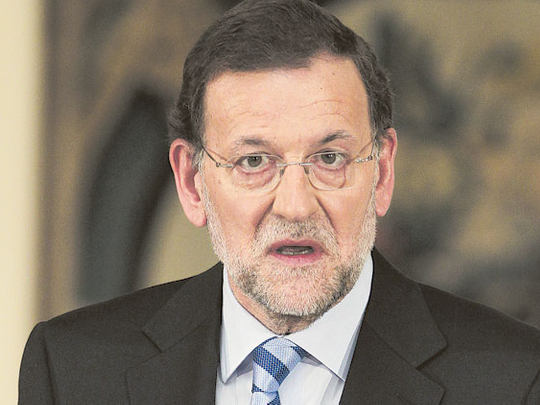
Madrid: Spain’s recession worsened in the second quarter as consumer spending was battered by an austerity effort that is set to triple in scope through 2014 to tackle the euro area’s third-biggest budget deficit.
Gross domestic product in the three months through June declined 0.4 per cent from the previous quarter, when it fell 0.3, the Madrid-based National Statistics Institute said on Tuesday. That is in line with an estimate of 0.4 per cent on July 30, before the institute revised down Monday’s economic data for 2010 and 2011.
The economy grew 0.4 per cent last year, down from the 0.7 per cent initially stated, the agency said. The 2010 contraction was 0.3 per cent, more than the 0.1 per cent decline first reported.
Prime Minister Mariano Rajoy last month gave up on his forecast for a return to growth in 2013 as he unveiled budget cuts that will expand austerity measures to a total of 15 per cent of annual GDP by 2014. The budget deficit was nearly unchanged in 2011 at 8.9 per cent of GDP as the euro area’s fourth-biggest economy slipped back into recession.
Bank aid
The yield on Spain’s 10-year benchmark bond rose three basis points to 6.41 per cent at 8.48am in Madrid before a sale of three-month and six-month Treasury bills. The yield has fallen 134 basis points since a euro-era intraday record of 7.75 per cent on July 25 as investors speculate Rajoy may request a second international bailout involving the European Central Bank. The government signed off on as much as ¤100 billion of loans to shore up banks burdened with bad debt on July 24.
The Spanish GDP report showed that investment dropped three per cent in the three months through June from the previous quarter, while household spending fell one per cent and exports of goods and services rose 1.6 per cent. Government spending declined 0.7 per cent after decreasing by 0.9 per cent in the previous three months.
Public finance figures due August 31 may show Spain is struggling to cut its deficit to 6.3 per cent of GDP this year and reach the European Union limit of three per cent of GDP in 2014. Economists project the country’s GDP to contract 1.6 per cent in 2012 and 0.9 per cent in 2013 according to the median forecast of 30 economists surveyed by Bloomberg News.
Support declining
Support for Rajoy’s People’s Party has slipped eight percentage points since it won 40.6 per cent of votes in a landslide in November, as the premier has turned his back on campaign pledges by raising levies on income, scrapping a tax break for homeowners and cutting health care and education spending.
His fourth budget-tightening exercise in eight months will lead to an increase of the value-added tax this week and cuts in jobless benefits and civil servants’ wages before the end of the year.
The VAT increase will take place on September 1 after a flurry of data signaling pressure building on household finances. A report yesterday showed residential mortgages fell 25.2 per cent from a year ago in June while prescription pharmaceutical spending fell close to 24 per cent in July, the most on record, after the cost of drugs for patients increased.
Tax increases are seen boosting the inflation rate to an eight-month high of 2.3 per cent, according to the median forecast of 10 economists in a Bloomberg News survey. Meanwhile, July retail sales figures are expected to signal weaker spending on August 31, after a 5.2 per cent annual decline in June.












